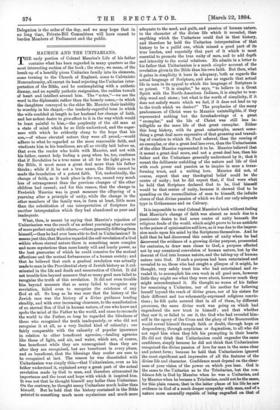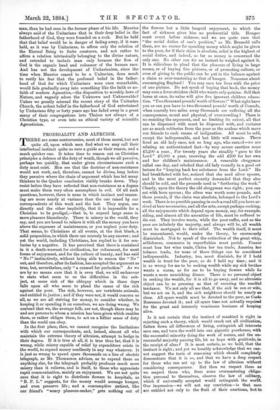MAURICE AND THE UNITARIANS.
THE early portion of Colonel Maurice's Life of his father contains what has been regarded in many quarters as the most interesting section of the book ; the story, we mean, of the break-up of a heartily pious Unitarian family into its elements, some turning to the Church of England, some to Calvinistic Nonconformity, all except its head rejecting the Unitarian inter- pretation of the Bible, and he contemplating with a pathetic dismay, and an equally pathetic resignation, the sudden tumult of heart and intellect around him. The "notes,"—we use the word in the diplomatic rather than the homely sense,—in which the daughters conveyed to the elder Mr. Maurice their inability to worship in his chapel,—the tenderly-regretful tone in which the wife confided at length to her husband her change of faith, and her ardent desire to give effect to it in the way which would be least painful to him,—the perplexity of the old man at a state of mind which he so little understood, and the eager- ness with which he evidently clung to the hope that his son,—of whose elevated nature they were all proud,—would adhere to what he regarded as the more reasonable faith, and vindicate him in his loneliness, are all so vividly laid before us, that even the reader who holds with Maurice, and not with his father, cannot help feeling a pang when he, too, confesses that if Revelation be a true name at all for the light given in the Bible, it must mean a great deal more than his father thinks ; while if it be not a true name, the Bible cannot be made the foundation of a potent faith. Yet, undoubtedly, the change of faith, as it took place in the son, caused very much less of estrangement than the previous changes of the other children had caused ; and for this reason, that the change in Frederick Maurice was in great measure the offspring of a yearning after a principle of unity, while the change in the other members of the family was, in form at least, little more than the substitution of one interpretation of Scripture for another interpretation which they had abandoned as poor and inadequate.
What, then, is meant by saying that Maurice's rejection of Unitarianism was the result of an ardent yearning after a centre of more perfect unity with others,—others generally differing from himself,—than he had ever been able to find in Unitarianism? It means just this, that Maurice regarded the self-revelation of a God within whose eternal nature there is something more complex and more mysterious than mere lonely will and lonely power, as the best guarantee of which he could conceive for the mutual affections and the mutual forbearances of a human society; and that he believed that such a gradual revelation was actually made to man in the Providential story of Jewish history as it cul- minated in the life and death and resurrection of Christ. It did not trouble him beyond measure that so many good men failed to recognise the truth of this revelation. It did not even trouble him beyond measure that so many failed to recognise any revelation, failed even to recognise the existence of any God at all. So long as he was sure that the history of the Jewish race was the history of a divine guidance tending steadily, and with ever increasing clearness, to the manifestation of an eternal Son of God in human nature, of one who knew and spoke the mind of the Father to the world, and came to reconcile the world to the Father, so long he regarded the blindness of those who recognised the truth inadequately, or who did not recognise it at all, as a very limited kind of calamity ; one fairly comparable with the calamity of popular ignorance in relation to other beneficent agencies,—healing agencies like those of light, and air, and water, which are, of course, less beneficent while they are unrecognised than they are after they are recognised, but are beneficent in every phase, and so beneficent, that the blessings they confer are sure to be recognised at last. The reason he was dissatisfied with Unitarianism was simply this,—that Unitarianism, even as his father understood it, explained away a great part of the actual revelation made by God to man, and therefore attenuated its importance and the trust and hope with which it inspired him. It was not that he thought himself any holier than Unitarians. On the contrary, he thought many Unitarians much holier than himself. But he held that the history contained in the Bible pointed to something much more mysterious and much more
adequate to the need, and guilt, and passion of human nature, in the character of the divine life which it revealed, than anything which the Unitarians could find in that history, and therefore he held the Unitarian interpretation of that history to be a pallid one, which missed a good part of its true burden, and especially that part of it which is most essential to promote the true unity of men, and to add depth and intensity to the social relations. He admits in a letter to his father that Unitarianism is a much simpler account of the revelation given in the Bible than his own faith. But then, what it gains in simplicity it loses in adequacy, both as regards the actual language of Scripture, and also as regards that actual life in man in its appeal to which the language of Scripture is so potent. "It is simpler," he says, "to believe in a Groat Spirit with the North-American Indians, it is simpler to wor- ship wood and stone ; but what is the worth of simplicity, if it does not satisfy wants which we feel, if it does not lead us up to the truth which we desire ?" The prophecies of the many predecessors of Christ were to Maurice unintelligible, if they represented nothing but the foreshadowings of a great "exemplar," and the life of Christ was still less in- telligible as the mere life of that great exemplar. Either this long history, with its great catastrophe, meant some- thing a great deal more expressive of that groaning and travail- ing of creation to which St. Paul referred, than the coming of an exemplar, or else a great deal less even, than the Unitarianism of the elder Maurice represented it to be. Maurice believed that it meant a great deal more, and not a great deal less, than his father and the Unitarians generally understood by it ; that it meant the deliberate unfolding of the nature and life of God with such power and passion as to inspire in man a trans- forming trust, and a uniting love. Maurice did not, of course, expect that any theological belief could be the centre of unity ; but he did expect that, if God were what he held that Scripture declared God to be, God himself would be that centre of unity, because it showed God to be spending on the reconciliation of men to himself, the infinite stores of that divine passion of which we find our only adequate type in Gethsemane and on Calvary.
It is impossible to read Colonel Maurice's book without feeling that Maurice's change of faith was almost as much due to a passionate desire to find some centre of unity beneath the religions fends of the world, which might prove to be an antidote to the poison of opinionative self-love, as it was due to the impres- sion made upon his mind by the Scriptures themselves. And he held that he had discovered this centre of unity when he had discovered the evidence of a growing divine purpose, prosecuted for centuries, to draw man closer to God, a purpose effected not by any unnatural convulsion of human nature, but by the descent of God into human nature, and the taking-up of human nature into God. If such a. purpose had been entertained and revealed to us, those who had caught a glimpse of it might, he thought, very safely trust him who had entertained and re- vealed it, to accomplish his own work in all good men, however little they might see what they were about, however much they might misunderstand it. He thought no worse of his father for remaining a Unitarian, nor of his mother for believing herself beyond the reach of divine grace, nor of his sisters for their different and too vehemently-expressed religions convic- tions ; he felt quite assured that in all of them, by different processes, the same divine work was going on which had engendered the new trust in himself ; and that whether they saw it, or failed to see it, the God who had revealed him- self in the agony of the Cross and the glory of the Resurrection would reveal himself through faith or doubt, through hope or despondency, through scepticism or dogmatism, to all who did not repel him when they felt his prompting in their hearts. He did not think that Unitarianism could engender the same confidence, simply because he did not think that Unitarianism recognised the divine passion of love for man in the same clear and potent form; because he held that Unitarianism ignored the most significant and impressive of all the features of the divine life and character. Confidence must depend on the clear- ness of your vision of the power on which you lean. God is the same to the Unitarian as to the Trinitarian, but the con- fidence felt in God by Maurice when he was a Unitarian, and by Maurice when he became a Trinitarian, could not be the same, for this plain reason, that in the latter phase of his life he saw evidence in God of a much deeper sympathy with man, and of a nature more assuredly capable of being engrafted on that of
man, than he had seen in the former phase of his life. Maurice always said of the Unitarians that in their deep belief in the fatherhood of God, they were founded on a rock. But he held that that belief would be in danger of fading away, if it were held, as it was by Unitarians, to affirm only the relation of the Eternal Being to finite creatures, and not rather to affirm a relation intrinsically belonging to the divine nature, and extended to include man only because the Son of God is the organic head and redeemer of the human race. And has not the development of Unitarianism, since the time when Maurice ceased to be a Unitarian, done much to verify his fear that the profound belief in the father- hood of God for which Unitarians were once remarkable, would fade gradually away into something like the faith or no- faith of modern Agnostics,—the disposition to worship laws of Nature, and vaguely adore the Unknown and Unknowable ? Unless we greatly misread the recent story of the Unitarian Church, the ardent belief in the fatherhood of God entertained by Unitarians fifty or forty years ago has faded away in a great many of their congregations into Theism not always of a Christian type, or even into an ethical variety of scientific Agnosticism.



































 Previous page
Previous page